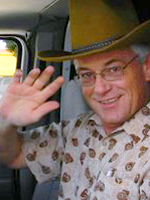Parents irked over talk of drug testing
Leon Worden · October 1, 1997
Canyon High School's parent advisory committee drew a bigger crowd than usual Monday night. Many of the 60-plus parents had children in various sports programs, and they were upset that the local high school district is singling out their kids for possible drug testing.
Said one: "A lot of athletes join sports to stay out of drugs. (The district is) targeting the wrong group."
Another: "Football players and other athletes are at school until 6, then they go home and do their homework. It's wrong to target a group that represents the school (on the playing field)."
Another: "What about the child who has had an experience with drugs and alcohol but avoids sports because he doesn't want to run the risk of testing positive, when sports might save him?"
Another: "If it wasn't for sports I wouldn't have gotten out of high school."
Another: "Most athletes aren't using drugs. Most are excellent students."
Another: "What proves athletes have the numbers (to warrant testing)?"
Another: "Drug testing is expensive. Why should the district pay for drug testing when we have kids sharing books?"
Another: "I'm sure if all the teachers and administrators were tested, there wouldn't be too much argument from the kids. Otherwise it's hypocritical."
And so it went. Most parents were of like mind -- except for the LAPD sergeant whose son plays on the football team. "When I told my son about the meeting tonight he said we wouldn't have half our team" if they were tested for drugs.
That isn't a statement about any one particular school. All four high schools, and to a lesser but very real extent all four junior highs, have the same problem.
Of course nobody is suggesting that it's limited to sports. Athletes are the only students the district can legally test, says Dr. Mike Allmandinger, administrator of student services for the Wm. S. Hart Union High School District.
Drug use is on the rise, Allmandinger says. "We recently caught one kid with 50 tablets of LSD for sale. Another had $140 in his pocket and a bag of marijuana in his lap."
"Marijuana is the biggest problem right now, although LSD and speed aren't far behind. Thirty-eight students were recommended for expulsion in the last year because of drugs, and there were 119 drug-related crimes on our campuses from July, 1996 to June, 1997. Each high school is affected, and each has had students suspended and expelled." The district has not revealed whether any of the 38 were enrolled in sports.
Kids caught with drugs at school are suspended for five days and are offered the opportunity to attend drug awareness classes during that time.
If the district imposes drug testing and a student tests positive, there would be no academic repercussions, Allmandinger says. "The only consequences would be in sports. It's not like we caught them using drugs on campus. Our intent would be to assist the family in getting help."
Also, any testing would be done by an outside agency, not by school nurses. Until the decision is made, "I couldn't tell you exactly what they would test for. But alcohol, PCP, marijuana, cocaine and amphetamines are some of the things that other school districts test for." Schools around the nation which use the "pee in a cup" type of drug testing report a 99.95 percent accuracy rate, Allmandinger says.
While the focus is on mandatory drug testing, voluntary testing is on the table, too. Simi Valley schools use a form of voluntary testing where the results are known only to the student and his parents without any consequences, Allmandinger says.
The results of mandatory testing, on the other hand, would be known to the student, the parents and the school -- something Allmandinger sees as a potential deterrent to drug abuse. "When a kid drops off the team in the middle of the season for no apparent reason, it becomes rather obvious. The reality is, some kids need this kind of incentive to stay clean."
Frankly, I was surprised by what I didn't hear from the parents. Nobody said anything about extracurricular sports being a privilege and not a right. Nobody mentioned that the high standards we set for athletes should apply both on and off the field. Sure, I can buy the argument that other students should be tested, too. But what hurt the ears was, "Not my kid" and "Athletes don't do drugs."
What are we afraid of? Does our denial really run that high?
"People just don't want to know the truth," Allmandinger says. "They think, 'Everything's OK, so leave it alone.'"
Leon Worden is a Santa Clarita resident. His commentary appears on Wednesdays.
©1997 LEON WORDEN — ALL RIGHTS RESERVED

